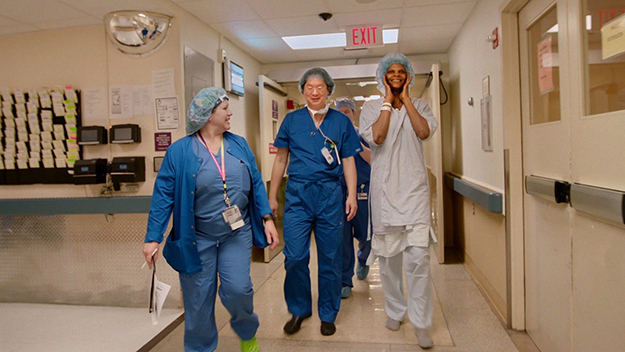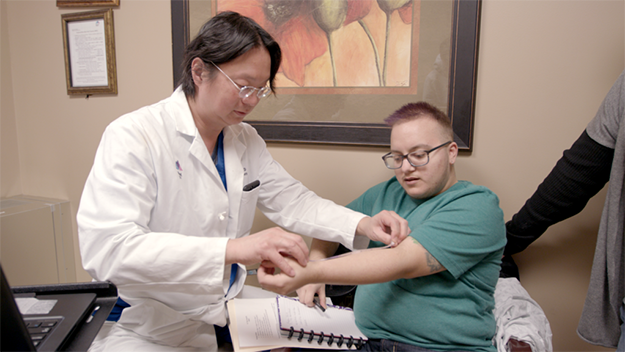Close Reading: Born to Be
The Critics Academy, a program of Film at Lincoln Center and a venture of Film Comment, is a workshop for aspiring film writers, providing a valuable platform to launch their careers. Throughout the 57th New York Film Festival, Film Comment will be publishing work from young critics taking part in the program.

Tania Cypriano’s Born to Be follows the entire process of gender reassignment surgery to articulate the complexities of a community whose health has long been treated as peripheral. Avoiding discussions of gender theory, Cypriano focuses on the purely physical and emotional journey of those whose lives have been shaped by society’s evolving relationships with gender. It’s a tightrope-walk process, and thanks to her camera, we are there when a young, teary-eyed woman declares her transition “done”—and still there when she returns to the hospital post-transition, this time as the result of a suicide attempt. As the film shows, gender affirmation surgery can prove crucial for the person seeking it to exist comfortably in their own body, while also improving their reception in the world, but it cannot correct societal resentment. (In Pedro Almodovar’s All About My Mother, Agrado says of the process, gesturing to her surgically feminized nose, now crooked: the procedure was “a waste of money. Another beating left it like this.”) Born to Be champions individual agency to seek surgery while stressing the beatings, literal or proverbial, that it cannot transfigure, thus refraining from holding medicine responsible for unilateral progress and underscoring transgender critic Andrea Long Chu’s declaration: “Transition doesn’t have to make me happy for me to want it.”
Cypriano’s film never loses sight of the reason for its conception, laying bare the triumphs and limits of the gender affirmation process in painstaking, clinical detail. Shot in vérité style to capture views of bodily construction unavailable to the anesthetized patients themselves, it is a film that aims to demystify struggles of, and thus elicit hard-won compassion for, transgender-identifying individuals. Dr. Jess Ting’s practice at Mount Sinai Center for Transgender Medicine provides Cypriano with her film’s guiding framework; following him and those he treats allows an audience to witness patients from all over New York at the culmination of their gender interrogations. Filming in a hospital allows Cypriano to focus her lens on cultural priorities—the quality of clinical care, the refinement of a procedure, what an insurance company is willing to cover—all of which expose how society evaluates a life. What and who are worthy of resources? In New York City, advanced care for transgender and non-binary people merits its own hospital center, but Mount Sinai Center for Transgender Medicine only opened in 2016; we see Ting, body wracked with coughs, struggling to make his rounds, but we aren’t explicitly told why the hospital is so understaffed and overwrought.
In an official statement for the film, Cypriano puts the current state of affairs bluntly: “Medical education in transgender care is running very behind as there is a huge lack of research on transgender health.” When I spoke to her after a screening at the New York Film Festival, she verbalized her fear of making explicit the film’s inherent politics: “I was really scared,” she says, of “censorship” from distributors. But Ting provides an affable, cisgender father figure who serves to introduce a multiplicity of gender identities, experiences within those identities, and ultramodern medical procedures used to bring them into being. The film is “about” Ting only insofar as it draws attention to the enormous amount of pioneering being shouldered by one human being and his team of ten, responsibility which never slips into self-importance: “There is no glory,” says Ting in one scene, through nervous laughter. “There’s only terror.”

The choices involved in gender reassignment surgery entail for many a kind of “triage” of identity. Some of Ting’s patients are more accustomed to this process than others; none felt like they had any other choice. Garnet, a young Texan transplant, relinquished college to save money for her transition; Mahogany, a martial arts practitioner and writer, abandoned a successful modeling career because it was predicated on a male gender performance. The eldest patient in the film, Naomi (at the time of filming she used the name “Cashmere”) is also the most practiced in radical coping, as a sex worker who miraculously survived the AIDS crisis. Her cavalier attitude was cultivated over a lifetime of tenacity (”Everybody in Paris Is Burning is dead,” she says at one point). To Ting’s medical proposal of a vaginoplasty, she declares: ”I’ll take it.” One comment reveals how she has postponed momentous life experiences on the basis of dysphoria: after she receives her vagina, she says, “Someone’s gonna fall in love with me.”
Cypriano says she made sure to focus on those of Dr. Ting’s patients who exemplify the diversity of the trans community. Due to the inadequacy of transgender care, all of the patients seen on screen have lives varyingly, but not solely, defined by the process of struggling towards themselves. The film’s snapshots of its subjects are also comprised of their eccentricities, their loves (platonic and romantic), their wished-for loves, their tattoos and jewelry and multi-colored panties—in other words, human beings existing as more than just embodied political commentary. Jordan, a non-binary individual, met their partner through a shared devotion to Judaism. Mahogany, a woman whose smile is beatific even amongst a face charted with areas marked for reduction and contouring, has a passion for modeling. As does Garnet, a Texan who approaches her identity cooperatively with her mother. Dr. Ting’s team with their pre-surgical promise to Mahogany—“We’re going to make her whole again”—conveys the understanding that a constructed organ can be more natural than its predecessor, that changes made to the body confirm personhood even as they violate the flesh.
Born to Be both reveals the revolutionary work being done on the frontiers of gender-affirming surgery (even the title of the surgery, in its quiet insistence of human agency over biology, is a reframing) and the heartbreak of realizing that, regardless of technological advancements, fidelity to the gender binary lingers. The sophistication of Ting, a New York bassist-turned-surgeon, engineering a self-lubricating, sensitive vagina from a section of stomach lining stands in severe contrast to the humiliations trans people are forced to experience, embodied in situations like one of Garnet’s post-op dates at a bar where her date abandons her after the subject of transition arises. Cypriano’s film is an empowering look at those who are helping to achieve the life-or-death work of catching up, and a call to responsibility for those whose stake in the gender versus biology debate rests solely on fidelity to tradition.
Bessie Rubinstein is a writer, based in either West Harlem or Fordham Lincoln Center depending on the time of day.







